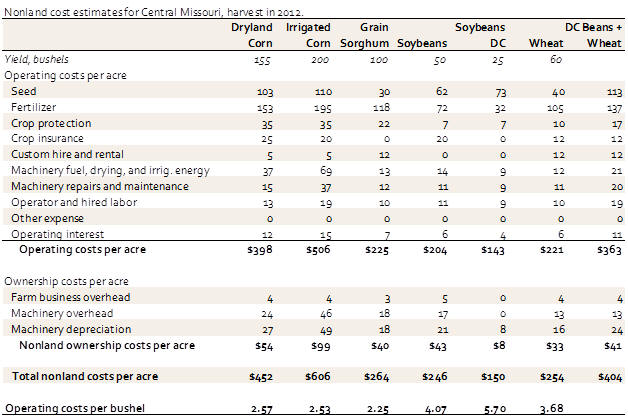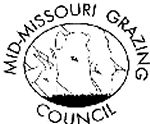

To send a message to an author, click on the author's name at the end of the article.
This Month in Ag Connection | Ag Connection - Other Issues Online
Livestock producers have probably seen brown bottles of "liquid minerals" on the shelves at a local veterinary office or farm store. What is actually in them and do they actually work? Previous research studies have indicated mixed results.
The latest data out of University of Arkansas (U of A) indicates injectable mineral supplements work well on highly stressed and newly received beef heifers. In this particular study, 90 head of crossbred heifers from a local sale barn were taken to a U of A research farm, a very typical scenario of many backgrounding operations throughout Missouri. When the heifers were received at the research farm, they were randomly assigned to one of three treatments. Two treatments were subcutaneous injectable trace mineral solutions containing varying levels of zinc, manganese, copper and selenium and a negative control group which received no injection.

The study showed average daily gain was greater for heifers receiving injectable minerals compared to the control, but did not vary between the injectable mineral groups. Total feed consumption and total gain:feed was greater for the injectable mineral groups than for the control group. One of the injectable treatment groups had a reduced incidence of Bovine Respiratory Disease. Antibiotic treatment cost was greater for the control group than for the injectable mineral groups. Does this mean when producers get a new batch of calves they should automatically give injectable minerals to them when they come to your farm, backgrounding operation or feedlot? This study would suggest so.
During this study, the control group had an antibiotic treatment cost of $13.66 compared to $9.47 and $8.07 for the two trace injectable mineral groups. Since the trace mineral injection cost was less than $1.50 per animal, it is obvious that the investment of the injectable trace mineral product more than paid for itself. However, other studies have shown mixed results, possibly due to different research protocols.
Although more research needs to be done on mineral nutrition, this study suggests producers might consider injectable minerals when buying highly stressed calves, especially with a potential reduction in antibiotic cost. More details on the study can be found at the following website: http://arkansasagnews.uark.edu/574-24.pdf.
Source: Wendy Flatt Rapp, MU Extension Livestock Specialist
This Month in Ag Connection | Ag Connection - Other Issues Online
Miscanthus (Miscanthus x giganteus) hybrid grass is being promoted by several universities and other organizations as a solution to some of our energy needs. Reading articles and watching videos on miscanthus would lead people think it is the best new idea around with no problems. Miscanthus has been evaluated and widely planted in Europe during the past 5-10 years as a bioenergy crop. In spite of perceived positive attributes, there may be negative considerations to planting this crop. More Missouri research is needed to answer these questions.
Some promoted advantages are:

Some of the not so commonly mentioned disadvantages or questions are:
There are a number of giant miscanthus grass plantings planned this spring in central Missouri. More will be learned about miscanthus, bioenergy crop establishment and production through these and other plantings.
Dr. Emily A. Heaton, Assistant Professor of Agronomy at Iowa State University, has stated that the ideal dedicated biomass crop is a perennial that efficiently uses available resources, stores carbon in the soil, is an efficient user of water, has low fertilizer requirements and is not invasive. Giant miscanthus (Miscanthus x giganteus) possesses many, if not all, of these characteristics.
Source: Jim Jarman, MU Extension Agronomy Specialist. Information came from the University of Missouri and other land grant universities, USDA, NRCS's Technical Note No. 4, "Planting and Managing Giant Miscanthus as a Bioenergy Crop", and videos from the US and Europe.
This Month in Ag Connection | Ag Connection - Other Issues Online
Each fall, the University of Missouri releases estimates for the costs of producing the major crops grown in Missouri. The table below shows non-land economic costs for typical farms with a specified set of production practices. View these numbers as being representative of a 2000 acre farm in central Missouri producing better than average yields with costs adjusted accordingly.
Your cost will differ. However, you can use these budgets as a template to customize estimates for your farm. Download the Crop Budget Generator spreadsheet at the FAPRI Missouri site, http://www.fapri.missouri.edu. Also available online are detailed reports for each crop, showing the assumptions and various inputs underlying the cost estimates. For assistance or more information, contact Brent Carpenter at the Pettis County Extension Center, Parman Green at the Carroll County Extension Center or Mary Sobba at the Audrain County Extension Center.
Web version link: http://www.fapri.missouri.edu/farmers_corner/budgets/index.asp?current_page=farmers_corner.

Source: Brent Carpenter, MU Extension Ag Business Specialist
This Month in Ag Connection | Ag Connection - Other Issues Online
Recently, there have been several reports of agriculture theft in the Central Missouri area. Most of those thefts have been reported to the Johnson County (KS) Sheriff's office, which started a program to help fight agriculture and construction theft in Missouri and Kansas. The program is designed to assist in the prevention and recovery of equipment and livestock. The public is invited to participate in the program named Theft Reports of Agriculture and Construction Equipment (T.R.A.C.E.) Program.

The program uses e-mail for communication. Individuals or law enforcement report theft to the Johnson County Sheriff's office, which then sends out an e-mail to the participants registered with T.R.A.C.E. The objective is to quickly inform participants of suspicious activities and crime in their neighborhood, farming community and construction sites. This allows more eyes and ears looking for the stolen goods. If stolen goods are identified, then proper law authorities are notified.
This program is not intended to replace 911. Emergency calls and reports should continue using 911. The program is a next step for agriculture theft.
Agriculture producers, livestock owners, implement dealers and other interested parties are invited to register to become a part of T.R.A.C.E. To register go to the Johnson County Sheriff's website at www.jocosheriff.org, then click on the T.R.A.C.E. logo and register.
Source: Mary Sobba, MU Extension Ag Business Specialist
This Month in Ag Connection | Ag Connection - Other Issues Online


February 9, 2012
Capital Plaza Hotel — 415 W. McCarty- Jefferson City, MO
8:30am - 3:30pm
Dr. Martin Kautsch, Quail Valley Veterinary Clinic, Jefferson City, MO
"Preparing Beef Cattle for the Breeding Season"
Ken Miller, Burleigh County SWCD, Bismarck, North Dakota
"Soil Health"
Come see the Trade Show beginning at 8:00 a.m. (Morning sessions begin at 9:00 a.m.)
- Multispecies Grazing Systems
- Getting the Most $ Out of Forage Crops
- Winter Annual Pasture Cover Crops
- Whole Farm Forage Management to Enhance Livestock and Wildlife Production
- Beef Quality Assurance
- Organic and Natural Food Production - Standards and Resources
- Small Ruminant Forage Management
Advanced registration by Feb. 3rd, 2012: $50.00 individual, $85 couple or $25 student
Late/Door Registration: $85 individual, $120 couple or $35 student
Includes: Meal, Refreshments & Proceedings
To Register, Send check to: Cole County SWCD, 1911 Boggs Creek Rd, Jefferson City, MO 65101
Checks payable to: Cole County SWCD
For more information: Ed Gillmore or Peggy Lemons at 573-893-5188 ext. 3
This Month in Ag Connection | Ag Connection - Other Issues Online
Publishing Information
Ag Connection is published monthly for Northeast and Central areas of Missouri producers and is supported by the University of Missouri Extension, the Missouri Agricultural Experiment Station, and the MU College of Agriculture, Food and Natural Resources. Managing Editor: Mary Sobba.